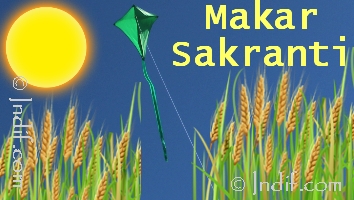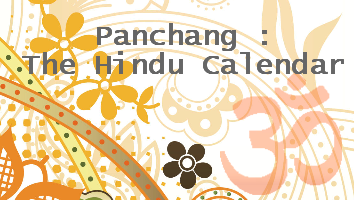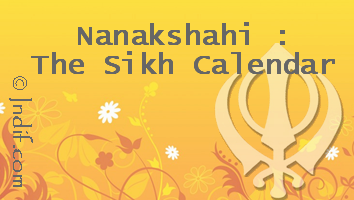![]()
Sankranti (संक्राति) means 'sacred changes,' migration of the Sun from one Rashi (zodiac in Indian astrology) to another. In Hindu calendar there are 12 Sankranti's in a year. According to Solar Calendar, followed in most of the southern Indian states, Sankranti marks the beginning of a month. While in some states like Bengal and Orrisa, which follow Solar calendar, it marks the ending of the month. Sankranti days are considered good for charity, while all auspicious ceremonies are avoided on the day of Sankranti. Among the 12 Sankranti's, Makar Sankranti is the most significant one and it is observed throughout India.
Sankranti Calender 2017
Date |
Festival |
संक्राति |
| January 14 | Makar Sankranti | मकर संक्राति |
| February 12 | Kumbh Sankranti | कुम्भ संक्राति |
| March 14 | Meena Sankranti | मीन संक्राति |
| April 14 | Mesha Sankranti | मेश संक्राति |
| May 14 | Vrishabha Sankranti | वृषभ संक्राति |
| June 15 | Mithuna Sankranti | मिथुन संक्राति |
| July 16 | Karka Sankranti | कर्क संक्राति |
| August 17 | Singh Sankranti | सिंह संक्राति |
| September 17 | Kanya Sankranti | कन्या संक्राति |
| October 17 | Tula Sankranti | तुला संक्राति |
| November 16 | Vrishchika Sankranti | वृश्चिक संक्राति |
| December 16 | Dhanu Sankranti | धनु संक्राति |
The Twelve Sankranti(s) -
- Makar Sankranti (मकर संक्राति): Makar Sankranti is an important festival in India. It is celebrated in the month of 'Magh' according to the Hindu calendar and usually occurs in the month of January. Makar Sankranti takes its name from the movement of the Sun into Makara or Capricorn and is celebrated as the start of the harvest season and the end of the northeast monsoon in South India.....Read more about Makar Sankranti.
- Kumbh Sankranti (कुम्भ संक्राति): Kumbh Sankranti, according to the Hindu Solar Calendar, marks the beginning of the eleventh month (Phalgun). It signifies the transition of sun from the Makar (Capricorn) Rashi to Kumbh (Aquarius) Rashi. On this day, taking dip in holy waters of Ganges especially in Triveni (confluence of three rivers in Allahabad) is considered highly auspicious. It is believed that the one who takes the dip in the holy river would get salvation and will be freed from the vicious circle of rebirth.
- Meena Sankranti (मीन संक्राति): Meena Sankranti, according to the Hindu Solar Calendar, marks the beginning of the twelveth and last month . It signifies the transition of sun to the Maish (Aries) rashi from the Meena (Pisces) rashi. Meena Sankranti is considered highly auspicious for all charity activities. In South India Sankranti is called as Sankramanam.
- Mesha Sankranti (मेश संक्राति): Mesha Sankranti is also known as Maha Vishuva Sankranti and Pana Sankranti. The day marks the beginning of the New Year in the traditional Hindu Solar Calendar. On this day the sun enters Mesha (Aries) Rashi. This day is known by different names throughout India including Naba Barsha, Baisakhi, Puthandu and Bihu. This day also signifies the end of the spring season and the beginning of summer.
- Vrishabha Sankranti (वृषभ संक्राति): Vrishabha Sankranti is also known as Vrushabha Sankraman. It signifies the transition of sun to the Vrishabha (Taurus) rashi from Mesha (Aries) rashi. Vrishabha Sankranti is the beginning of the second month in Hindu Solar Calendar. On Vrishabha Sankranti gifting cow is known as Gau Daan and is considered very important.
- Mithuna Sankranti (मिथुन संक्राति): Mithuna Sankranti or Sankramanam is celebrated as Raja Sankranti (Swing festival) in the state of Orissa. People in Orissa celebrate it as a four day long festival consisting of several interesting activities. Mithuna Sankranti is celebrated marking the occasion of Sun moving into another rashi or Zodiac called Mithuna (Gemini). It marks the beginning of the third Solar month in Hindu calendar. On Mithuna Sankranti gifting or donating clothes is considered highly auspicious.
- Karka Sankranti (कर्क संक्राति): Karka Sankranti marks the southern journey of Lord Surya. It marks the transition of the Sun into Karka rashi (Cancer). This also marks the end of the six-month Uttarayana period of Hindu Solar Calendar, and the beginning of Dakshinayana. Karka Sankranti is the counterpart of Makar Sankranti and it is considered significant for charity activities.
- Singh Sankranti (सिंह संक्राति): Simha Sankranti which is also known by the name of Simha Sankraman. It signifies the transition of sun to the Simha ( Leo) rashi from Karka (Cancer) rashi. It marks the beginning of the fifth month in Hindu Solar Calendar. Simha Sankranti marks the beginning of Malayalam calendar in Kerala.
- Kanya Sankranti (कन्या संक्राति): Kanya Sankranti signifies the transition of sun to Kanya (Virgo) rashi from Simha (Leo) rashi. It marks the beginning of the sixth month in Hindu Solar Calendar. This day is also celebrated as Vishwakarma Jayanti (birthday of Lord Vishwakarma), a deity who is known as the "The Architect of Gods."
- Tula Sankranti (तुला संक्राति): Tula Sankranti also known as Garbhana Sankranti is an important festival of Orissa. It signifies the transition of sun to the Tula ( Libra) rashi from Kanya (Virgo) rashi. It is celebrated on the same day as Mahashtami. This day is celebrated as a milestone for farmers when the rice plants grow up to show the ears of corns in their womb. In Karnataka, Tula Sankranti day is celebrated as Kaveri Sankramana, as the name suggests this festival is related to river kaveri .
- Vrishchika Sankranti (वृश्चिक संक्राति): Vrischika Sankranti, also known as Vruschika Sankramanam. Vrishchika Sankranti signifies the transition of sun to the Vrishchika (Scorpio) rashi from Tula (Libra) rashi. It marks the beginning of the eighth month in Hindu Solar Calendar.
- Dhanu Sankranti (धनु संक्राति): Dhanu Sankranti signifies the transition of sun to the Dhanu (Sagittarius) rashi from Vrishchika(Scorpio) rashi. It marks the beginning of the ninth month in Hindu Solar Calendar. On this day, Lord Surya or the Sun God is worshiped. Devotees take a dip in the holy rivers like Ganga, Yamuna, Godavari etc. It is celebrated with great enthusiasm in Orissa. Lord Jagannath is worshiped on this day.









